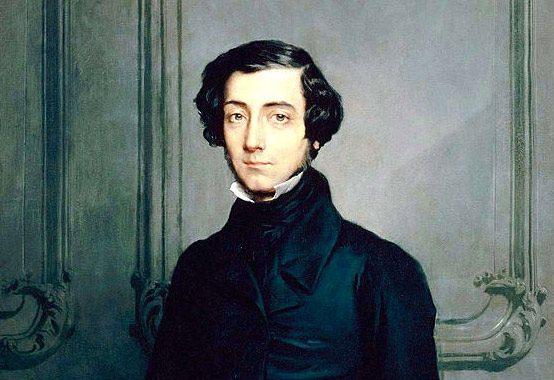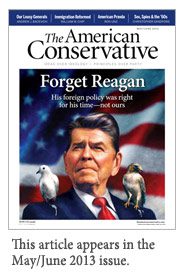Don’t Despair of Democracy

Alexis de Tocqueville is the great analyst and “prophet” of the “democratic revolution” that relentlessly continues to transform the modern world. He remains an indispensable reference point for everyone who wants to think about the human soul under conditions of modernity. In After Tocqueville, the conservative man of letters Chilton Williamson Jr. sets out to analyze Tocqueville’s insights and the prospects for democracy in a world marked by centralization, bureaucratization, moral relativism, and the full torrent of what Walter Lippmann called the “acids of modernity.”
Williamson admires Tocqueville even if he thinks that we live in a post-Tocquevillian age. He is a capable analyst of Tocqueville’s thought even if he does not always capture its exact nuances or remain faithful to its sober but demanding warning against both utopianism and despair. Williamson rightly describes Tocqueville’s “sympathy and controlled admiration for the young American democracy,” a sympathy and admiration that were “never blind to its flaws.” As Williamson notes, Tocqueville loved “liberty, legality, and respect for rights, but not democracy,” as the great Frenchman himself put it in a revealing private note in 1841. Democracy was a “political phenomenon” for Tocqueville and never a “faith” or an object of passionate and disfiguring love.
For his part, Williamson argues that modern democracy, transformed by “advanced liberalism,” has become a “false religion, a form of government based on faith,” or rather an anti-faith. “Modern democracies are morally relativist and inherently atheistic societies devoid of absolute principles….‘One Nation Under God’ may be a pretty phrase, but it is a lie nonetheless.” But surely a self-respecting Tocquevillian ought to challenge the moral relativism of late modern democracy in the name of those goods and principles—including religious faith—that are necessary to sustain a liberal order. “One Nation Under God” is not merely a slogan, however antiquated, but a description of the great desideratum of a free society that aims to do justice to the moral contents of life. One must contest the anti-traditional subversion of democracy both for the good of democracy and for the health of the human soul. It is a mistake to succumb to a fatalism that declares democracy to be an enemy of civilization and therefore of a life worthy of man.
If the task of free men and women remains to educate, moderate, and where possible to elevate democracy, it cannot be said that we live in a post-Tocquevillian age. Williamson insists that “the various elements hitherto thought necessary to civilization” do not include democracy. But if democracy remains our “fated circle,” as Tocqueville so suggestively put it in the final paragraphs of Democracy in America, then surely we are obliged to sustain civilization amidst the democratizing—the equalizing—pressures of the age. This is a demanding task, perhaps even a Sisyphean one, but one that need not culminate in inaction or despair. Williamson needs more confidence in the promise of democracy, even if he is right to eschew democracy as an object of religious faith.
If Williamson respects Tocqueville, he is positively scornful of contemporary commentators such as Francis Fukuyama and Bernard-Henri Lévy who in different ways have succumbed to democratic triumphalism. He cannot accept Fukuyama’s claim that “liberal capitalist democracy is the highest, most humanly fulfilling, and historically favored form of government, one likely to endure in fact and in ideal so far as the prophetic eye can see.” For Williamson, advanced liberalism, emphasizing autonomy and liberation from restraints, is transforming democracy—and human life—beyond recognition. (Witness the subversion of marriage in the name of a pure abstraction, “marriage equality.”) The modern democratic state wars with the intermediary institutions of society that Tocqueville famously praised as “barriers to tyranny.” A “New Class” of intellectuals, bureaucrats, experts, and technocrats displaces the patriotic elites of old. For a century or more, the left has challenged the great goods of our civilization that have a “connection to, affinity for, or compatibility with Christianity.” In a particularly memorable passage Williamson writes that “the Left today places Western culture, rationality, the rule of constitutional law, free markets, the white race, the human male, sexual morality, the family, ‘patriarchy,’ intermediate social institutions, moral restraint, and religious authority at the top of its list of idols for destruction.”
Democracy is more revolutionary, more acidic, more destructive of the goods of life than even Tocqueville had anticipated. And contra Fukuyama, the free, rational, and neutral political and social order at which it aims is destined to be “fundamentally unfree, irrational, and biased.” The partisans of the “end of history” are blind to the erosion of civilization and falsely believe that the human condition, marked as it always is by tragedy and the persistence of evil, can somehow be “solved.” (Williamson makes particularly good use of Bertrand de Jouvenel’s notion of “the myth of the solution.”)
If Fukuyama provided the theoretical support for the religion of democracy in the post-Cold War era, in Bernard-Henri Lévy’s book American Vertigo—a facile effort at replicating Democracy in America—the French “new philosopher” unintentionally highlighted “the displacement, by secularism and moral relativism, of traditional morality rooted in Christian doctrine.” In his effort to update Tocqueville’s travelogue, he did not see or appreciate the “indispensable connection between religious belief and democratic government on which Tocqueville insists throughout Democracy in America.” Instead, he expressed his chagrin at the persistence of poverty and capital punishment and the considerable strength of evangelical Christianity in the United States. Lévy won’t be content until the conservative features of American democracy are replaced in the name of a humanitarian, secular, and egalitarian version of democracy. Tocqueville lamented the tendency of democracy to continually “democratize;” Lévy in contrast applauds, or at least takes for granted, its self-radicalizing and “emancipatory” tendencies.
Williamson rightly observes, “it was in his fears, perhaps more than his hopes, that the author of Democracy in America proved himself to have been a man of deep intuition and a true prophet of history.” But his articulation of these themes did not aim to enervate or to undermine commitment to democratic liberty. Instead, his work was in the service of democratic self-correction. Unlike the aristocratic enemies of democracy, Tocqueville believed that the goods of human life could only be saved within the democratic dispensation. He rejected every kind of fatalism and upheld an “art of liberty” whose aim was precisely to moderate the tendency of democracy to free itself from its moral and cultural prerequisites.
Williamson is no doubt right that Tocqueville would be “shocked and scandalized by the United States today.” But since the alternatives available to the acting man still involve some variety of democratic liberty or democratic despotism, Tocqueville would surely caution against despair. Williamson, in contrast, takes aim at American exceptionalism, which he sees at best as a “pleasant fiction” that encourages a dangerously evangelical attitude toward the spread of democracy. But it is arguably the case that Tocqueville would still be impressed by the attachment of so many Americans to religious faith and to a proud and principled affirmation of the nation. Americans have not succumbed to the “pure democracy” lamented by the French political philosopher Pierre Manent, a European-style “democracy” that downplays national sovereignty, ignores the will of the people, and wishes to be “untainted by national, ethnic, and cultural peculiarities and prejudices.”
Williamson laments the absence of patriotism in post-national Europe but can see in American patriotism only an excuse for aggressive nationalism. Yet American resistance to the tyranny of international law—a resistance in crucial respects undermined by the present administration—is a victory for the nation and thus for the political form that is the natural home for democracy in the modern world. If the sovereign state and the democratic nation go hand in hand, America still offers an admirable alternative to the “non-national democracy” (the phrase is Manent’s) that is the dominant political form in Europe today.
As we have suggested, Williamson’s considerable learning and insight is undermined by a fatalism that borders on despair. He goes so far as to suggest that Russia, China, and the United States are in the process of “converging” into a new form of corporate nationalism. This version of “convergence” makes no more sense than the version put forward in the 1960s that foresaw the eventual convergence of Soviet Communism and American capitalism. Woefully underestimating the persistence of real forms of self-government in the United States, Williamson effectively declares dead a constitutional order that is still worthy of our loyalty and affection.
Of course, the rise of a bureaucratic New Class in the United States ought to be of grave concern to friends of liberty. But the profound differences between American liberty and a Leninist party-state in China and “managed democracy” in Russia are enough to make the prediction of a new convergence not only mistaken but bereft of even the slightest confidence in the capacity of American democracy for self-renewal. It is the quasi-fatalism of Williamson’s analysis—and his accompanying tendency to pronounce rather than to argue—that separates his approach from the sturdy sobriety of Tocquevillian political science.
 Many of Williamson’s pronouncements do not stand up to critical scrutiny. For example, he declares the Cold War to have been a form of “nationalist rivalry,” even though we know that Lenin and Stalin despised Russian national consciousness. And as the Soviet archives have confirmed, all Soviet leaders spoke their ideological, wooden language behind closed doors as well as in public. They thought and acted as the ideologists that they were. In contrast, post-Communist Russia pursues a national-minded foreign policy rather than the ideological one that was characteristic of the Soviet Union for 70 years. That is a source of potential conflict between Russia and the West but also a guarantee that there will be no return to the absolute animosity of old.
Many of Williamson’s pronouncements do not stand up to critical scrutiny. For example, he declares the Cold War to have been a form of “nationalist rivalry,” even though we know that Lenin and Stalin despised Russian national consciousness. And as the Soviet archives have confirmed, all Soviet leaders spoke their ideological, wooden language behind closed doors as well as in public. They thought and acted as the ideologists that they were. In contrast, post-Communist Russia pursues a national-minded foreign policy rather than the ideological one that was characteristic of the Soviet Union for 70 years. That is a source of potential conflict between Russia and the West but also a guarantee that there will be no return to the absolute animosity of old.
My reservations aside, Williamson has written a thoughtful and provocative book. His prose is often sparkling and his insights jarring. He allows us to think along with Tocqueville, Henry Maine, Walter Bagehot, Orestes Brownson, Bertrand de Jouvenel, Pierre Manent, Reinhold Niebuhr, and a host of other outstanding guides to our democratic discontents. He is right to warn us against “pushing forward, thoughtlessly and relentlessly” toward the “premature completion of history,” even if he underestimates the resources for civilizational renewal—resources that are discounted at our peril. For the foreseeable future, we are destined to live with the “acids of modernity,” and each generation is obliged to come to terms with the threats to democratic self-government and to the integrity of the human soul that accompany it. Williamson’s book is a welcome addition to the literature on this unnerving theme.
Daniel J. Mahoney holds the Augustine Chair in Distinguished Scholarship at Assumption College. He is the author, most recently, of The Conservative Foundations of the Liberal Order.
Comments